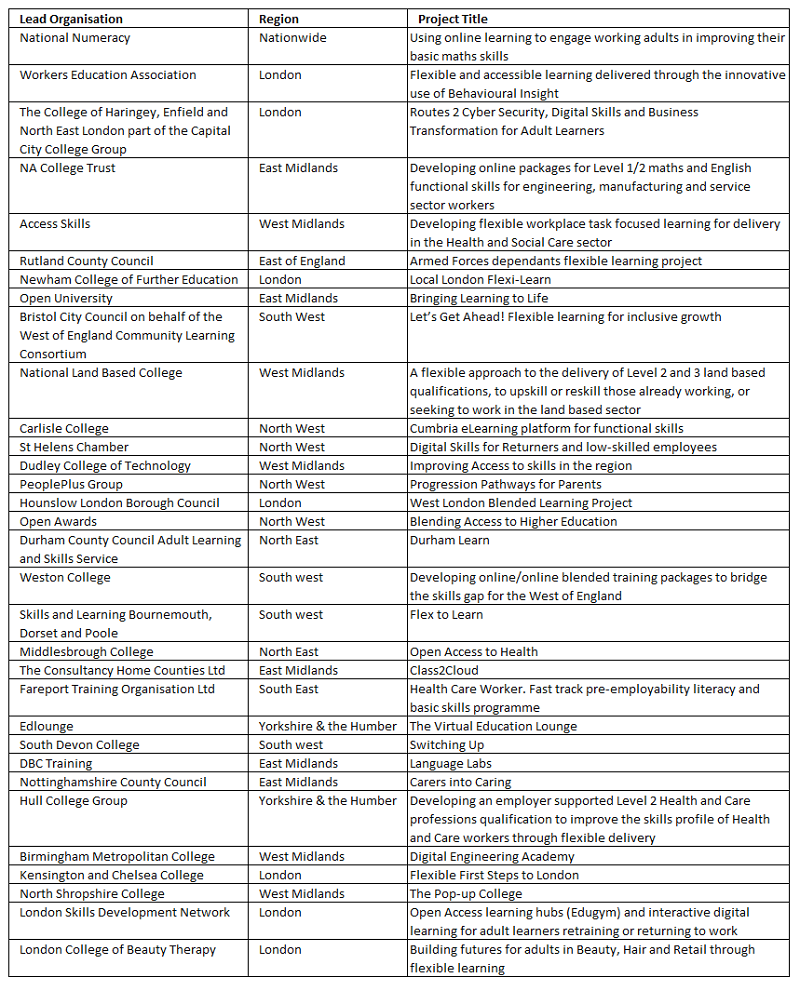Two providers managed to pull themselves up from grade four this week – one to ‘good’ and the other to ‘requires improvement’.
But at the other end of the scale there was disappointment for another provider as it failed to improve from its previous ‘inadequate’ grade.
Adult and community learning provider Essex county council boosted its grade from four to two, in a report published March 29 and based on an inspection in mid-February.
Leaders were praised for having worked “tirelessly” to “secure a wide range of improvements to the provision”, the report said.
Leaders were praised for having worked “tirelessly” to “secure a wide range of improvements to the provision”
Teaching, learning and assessment had “improved markedly” since the last inspection, in December 2016, with the result that the “large majority” of learners and apprentices “rapidly develop their skills and knowledge”.
The proportion of apprentices completing their courses on time was also “greater” than before, although “not enough” learners on unaccredited courses progressed onto “courses that lead to qualifications”.
Epping Forest College saw its rating go up to ‘requires improvement’ in a report published March 29 and based on an inspection in late-February.
Inspectors noted that, “despite improvements since the last inspection”, in November 2016, “actions to strengthen the quality of teaching, learning and assessment have not yet resulted in good teaching and good outcomes for learners”.
Management of apprenticeships and subcontracted provision was ‘inadequate’.
But “more learners achieve their qualifications than previously” and “behaviour has improved”, the report noted.
Independent learning provider UK Training and Development Limited failed to improve on its previous ‘inadequate’-overall grade in a report published March 28 and based on an inspection in October.
The apprenticeship provider, based in Hemel Hempstead, also received grade fours in two headline fields – along with three ‘requires improvement’ grades.
Safeguarding arrangements “remain ineffective”, the report said, with leaders criticised for failing to ensure that “staff follow statutory guidance to ensure that apprentices are safe”.
Governance arrangements were found to be inadequate, with leaders and managers not being “challenged rigorously or held to account for all aspects of the provision”.
In addition, “too many” apprentices were failing to make the progress “of which they are capable”, the report said – although “most apprentices” demonstrated “effective teamworking skills and provide good customer care”.
Plumpton College became the latest college to see its grade improve to ‘good’, from its previous grade three, in a report published March 26 and based on an inspection in February.
Learners at the land-based college were “excited about their subjects and the wider opportunities that staff provide”.
Learners at the land-based college were “excited about their subjects and the wider opportunities that staff provide”.
The “excellent arrangements” for work experience and enrichment activities “develop learners’ skills, knowledge and confidence well”.
“Senior leaders have exceptional partnerships with local and regional employers, schools and community leaders which benefit learners and the local community,” the report said.
There was less good news for Chesterfield College this week, which saw its grade drop from two to three in a report published March 26 and based on an inspection in mid-February.
Study programme learners “make insufficient progress”, while the teaching, learning and assessment on these courses was deemed “not good enough” and “dull and uninspiring”.
But apprentices, adult learners and those with high needs “make good progress from their starting points”, inspectors noted.
Two independent learning providers had reports published from their first-ever inspections this week: Mediprospects and Beacon Education Partnership Limited.
London-based Mediprospects, which delivers loans-funded provision, was rated ‘good’ across the board, in a report published March 29 and based on an inspection in mid-February.
Leaders and managers were praised for having “high expectations” and for creating a “highly aspirational learning environment in which learners develop good knowledge and skills required to work in the care sector”.
Thanks to “very good academic and pastoral support” learners “achieve their qualifications and progress well into care-related employment”, the report said.
Beacon Education Partnership Ltd, which also delivers loans-funded provision, was rated ‘requires improvement’ across the board in a report published March 28 and based on an inspection in late February.
Leaders were unaware that “too few” learners were “making good progress”, because they “do not gather sufficient and accurate information about the progress learners make”.
They were also criticised for failing to have “high enough expectations” of their learners, or to have “a clear plan to promote and develop learners’ English and mathematical skills”.
As previously reported by FE Week, the report into the second monitoring visit to Learndirect Limited following its inadequate grade last year was published this week – with a mixed bags of findings.
And the first ever report of a monitoring visit into subcontracting, published this week, criticised leaders at Wigan and Leigh College for being slow to improve performance.
| GFE Colleges | Inspected | Published | Grade | Previous grade |
| Epping Forest College | 20/02/2018 | 29/03/2018 | 3 | 4 |
| Wigan and Leigh College | 01/03/2018 | 26/03/2018 | Monitoring | Monitoring |
| Chesterfield College | 13/02/2018 | 26/03/2018 | 3 | 2 |
| Plumpton College | 20/02/2018 | 26/03/2018 | 2 | 3 |
| Independent Learning Providers | Inspected | Published | Grade | Previous grade |
| Mediprospects | 13/02/2018 | 29/03/2018 | 2 | – |
| Beacon Education Partnership Limited | 27/02/2018 | 28/03/2018 | 3 | – |
| UK Training & Development Limited | 17/10/2017 | 28/03/2018 | 4 | 4 |
| Learndirect Limited | 27/02/2018 | 27/03/2018 | Monitoring | Monitoring |
| Adult and Community Learning | Inspected | Published | Grade | Previous grade |
| Essex County Council | 20/02/2018 | 29/03/2018 | 2 | 4 |


